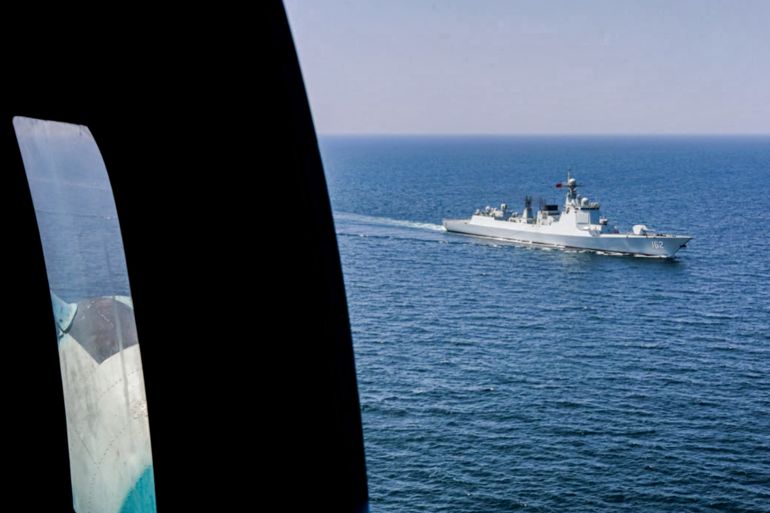Chinese navy’s 5-day Nigeria visit marks rare West Africa foray
The arrival of Chinese naval fleet in Nigeria comes amid speculation that the Gulf of Guinea could offer a base for Beijing.

A naval fleet of the People’s Liberation Army (PLA) led by the warship Nanning arrived on Sunday in Nigeria for a rare visit by the Chinese military to Africa’s Atlantic coast, where Beijing has long made efforts to grow its influence.
The Chinese ambassador to Nigeria hailed the five-day visit as a milestone in ties, and the Nigerian navy expressed willingness to work with China to tackle maritime security threats and maintain stability in the Gulf of Guinea, the Chinese embassy said in a statement on Monday.
Keep reading
list of 4 itemsWhat’s next as ‘heavy-handed’ US negotiates pullout from Niger?
A sanctioned strongman and the ‘fall’ of Myanmar’s Myawaddy
Russia-Ukraine war: List of key events, day 797
The destroyer and an accompanying frigate, Sanya, along with a supply ship, Weishanhu, arrived off the port of Lagos, with the Nanning berthing for a port of call through Thursday, the Nigerian navy said in a statement.
Oil-rich West Africa is part of the Gulf of Guinea and is an important global exporter of crude.
The Gulf of Guinea, described by the International Maritime Bureau as one of the world’s most dangerous and important shipping routes, covers 11,000sq km (4,247sq miles) and stretches from Angola to Senegal.
Since 2021, piracy cases have been on the decline due to cooperation among countries in the region and deployments of foreign naval ships, according to the United Nations Security Council.
Two of those countries, Angola and Nigeria, are among China’s top oil suppliers. Major Chinese oil explorer CNOOC Ltd also engages in deep-sea production off the coast of Nigeria.
In January, Nigeria opened a billion-dollar Chinese-built deep seaport in Lagos. State-owned China Harbour Engineering Co and the Singapore-based Tolaram group have a joint 75 percent stake in the new Lekki deep sea port, one of the region’s biggest.
Chinese Ambassador to Nigeria Cui Jianchun called the project a “game changer”.
There has also been speculation the Gulf of Guinea could offer a base for China’s military. Last year, American defence officials expressed concern that such a base, possibly in Equatorial Guinea, could threaten US national security.
In 2017, China opened its first overseas naval base in Djibouti, one of the world’s most important choke points for maritime trade, fanning concern that Beijing might set up more regional “logistics facilities” as its military develops the capacity to operate thousands of kilometres from home.
Over the last three decades, China has widened its influence in almost every African nation through investment, trade and loans.
In 2016, the cash-strapped island nation of Sao Tome and Principe in the gulf established relations with Beijing after cutting ties with democratically governed Taiwan, which China claims as part of its territory.